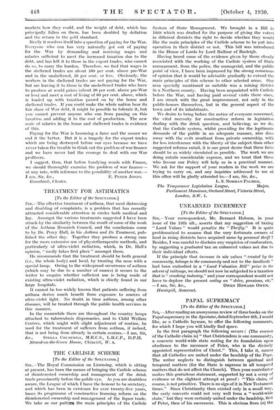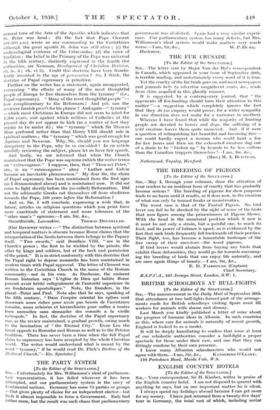PAPAL SUPREMACY
[To the Editor of the SPECTATOR.] Sm.—After reading an anonymous review of threebooks on the Papal supremacy in the Spectator, dated September 6th, I would like, as a Catholic layman, to offer the following comments, for which I hope you will kindly find space.
In the first paragraph the following occurs (The essence of the Catholic claim is) "that Christendom is one community, a concrete world-wide state resting for its foundation upon obedience to the successor of Peter, who is the divinely appointed representative of Christ." This, I take it, means that all Catholics are united under the headship of the Pope. The writer neglects to distinguish between spiritual and temporal matters (for the State is supreme in all temporal matters that do not affect the Church). Then your contributor makes this gratuitous statement, supported by not a scrap of evidence or the slightest attempt at proof : "This claim, of course, is not primitive. There is no sign of it in New Testament times." Since Christianity then existed only in a small way, the early converts could not very well form a "world-wide state," but they were certainly united under the headship, first of Peter, then of his successors. This is obvious from (a) the general tone of the Acts of the Apostles which indicates that St. Peter was head ; (b) the fact that Pope Clement (91-100 A.D.) wrote as one cGmmanding to the Corinthians although the great apostle St. John v: as still alive ; (c) the archaeological evidence of , the Catacombs; (d) the voice of tradition ; the belief in the Primacy of the Pope was universal in the fifth century,. distinctly expressed in the fourth (for authorities, see Newman, Dczielopment of Christian Doctrine, iv. 3; ch. vi 3). Could this doctrine have been fraudu- lently invented in the age of persecution? So, I think, the doctrine of Papal supremacy is primitive.
Further on the writer has a statement, again unsupported, concerning "the efforts of many of the most thoughtful people of Europe to free themselves from the tyranny" (i.e., Papal supremacy). , "Many of the most thoughtful people "— how complimentary to the Reformers ! And yet, can the reviewer furnish proofs for his phrase ? And again—" tyranny" —which most Christians in Europe did not seem to mind for 1,500 years, and against which millions of Catholics at the present day do not appear to kick (as a matter of fact they rejoice to be under it) ; the " tyranny " which Sir Thomas More preferred rather than that Henry VIII should rule in spiritual matters ; the " tyranny " which was good enough for Aquinas and Newman. Why, Sir, should you use language derogatory to the Pope, why be so one-sided ? In an article candidly reviewing the subject, please let us have fair speech. And lastly, we are informed that when the Church maintained that the Pope was supreme (which the writer terms an extravagance." I suppose, then, that "Thou art Peter," etc., is an " extravagance " also) "Luther and Calvin became an inevitable phenomenon." My dear Sir, the claim of Papal supremacy has been maintained from the first ages (as I demonstrated above) and is maintained now. It did nol come to light shortly before the (so-called) Reformation. Did not the schismatic Greeks cut themselves off from obedience towards the Pope, 500 years before the Reformation ?
And so, Sir, I will conclude, expressing a wish that, in future, articles on religious questions which you print have more exactitude of statement and more tolerance of the "other man's" opinions.—I am, Sir, &c.,
[Our Reviewer writes :—" The distinction between spiritual and temporal matters is obscure because Rome claims that the interpretation of the limits between them belongs to the Papacy itself. "Two swords," said Boniface VIII, "are in the Church's power ; the first to be wielded by the priests, the other by kings and soldiers, but at the beck and permission of the priest." It is in strict conformity with this doctrine that the Papal right to depose monarchs has been maintained in modern times with Papal approval. The letter of Clement was written to the Corinthian Church in the name of the Roman community—not in his own. As Duchesne, the eminent Roman historian says ` L'eglise de Dieu qui habite Rome pouvait avoir herite collegialement de l'autorite superieure de ses fondateurs apostoliques." Note, the founders, in the Plural—Peter and Paul. Note also that he says, speaking of the fifth century, " Dans l'empire oriental les eglises soot desorrnais assez riches pour avoir pas besoin de Passistance romaine, assez eclairees et hierarchisees pour suffire a toutes leers necessites sans demander des conseas a la vieille metropole." In fact, the doctrine of the Papal supremacy was, as the review maintained, a gradual growth, owing much to the fascination of "the Eternal City." Even Leo the Great appeals to Romulus and Remus as well as to the Petrine tradition. There has never been a time when the full Papal claim to supremacy has been accepted by the whole Christian world. The writer would understand what is meant by the word "tyranny," if he would read Dr. Flick's Decline of the Medieval Church."—ED. Spectator.] *





















































 Previous page
Previous page